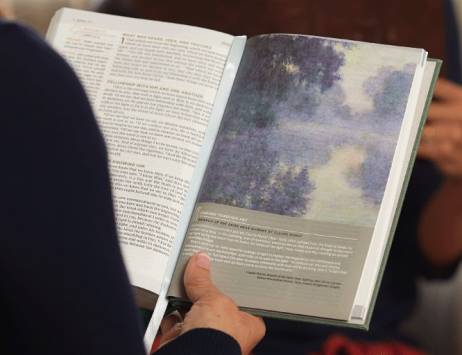How do we know if we are reading the Bible correctly? This question, which is posed in the title of this article, may sound odd, so let me tease this out. I remember sitting in a Bible study years ago when a friend proposed that “lady wisdom” mentioned in the Proverbs was a divine-like being who dwelled in the heavenly realms. Some of the people in the study looked curious, and others looked concerned. I gently responded, “No, the writer is simply using a literary device to personify God’s wisdom.” “But,” I said, “I’ll do some research and see what others have said as well.”
Within the next week, I pulled several books off my shelf and read several articles from trusted websites, and discussed this passage with several Christians—all the while, taking notes to grow in my ability to understand and articulate what the writer of Proverbs was doing in using that language.
We Don’t Have to Read the Bible Alone
Don’t miss the great privilege I enjoyed in doing research over this passage. When we read the Bible, we are not alone. The Bible is one of the most printed books in human history, and because of this, it also has one of the deepest wells of insightful literature to draw from. As the introduction to the Timeless Truths Bible states:
“As you study with the Bible we are welcomed into an ancient conversation, an interpretive community that stretches across time and knows no geographical boundaries. It is a community that includes the very earliest disciples of Jesus living in Jerusalem, the second century converts in Roman-ruled Africa and Europe, medieval monastics, the reformers, English puritans, American revivalists, and many more. This rich history affords us the opportunity to cultivate theological instincts and values from trusted guides.”
Read the Bible Humbly
With this in mind, we must approach the Bible with the humble belief that different voices have unique contributions to offer to our interpretation of Scripture. Indeed, the wisest of Christians in history have always drawn from the past to understand how to understand Scripture in the present. This is especially true when the historical distance between the modern reader and ancient text makes it difficult to understand certain parts of Scripture. In fact, two types of resources become particularly resourceful when it comes to understanding Scripture.
How to Read the Bible Correctly
First, many commentaries and study Bibles are available to help you understand the context, purpose, original language, and content of each book of the Bible. I remember one old Sunday School teacher of mine scoffing at the idea of using commentaries because he wanted “God’s thoughts, not man’s thoughts.” What he failed to see was the church has always been a community that contends earnestly for the faith that was once for all entrusted to the saints (Jude 1:3). In other words, the church is a learning and teaching community in which the passing on of the faith becomes part of the ministry we render to one another. Commentaries are one way to enter that conversation with other believers.
Second, we have theological works, creeds, confessions, and catechisms to help us understand how Christians have articulated certain doctrines of the faith throughout church history. You see, there have been several moments in history when the Church has come together to develop theological statements with the intent of fostering clarity and even unity under a common faith. It has been said that Christians believe more than is contained in these theological statements, but we cannot believe less. Some of these statements were written in response to a particular heresy or doctrinal controversy circulating from wrong readings of biblical passages. Other times, as Christians through the centuries have wrestled with the Bible’s challenging teachings, they were compelled to clarify key doctrines to help establish and protect the beliefs we hold dear.
Resources like these undoubtedly enrich the study of the Bible, an incomparable book. Indeed, the reflections and insights of faithful saints from across the globe and the centuries are a treasure trove available to many of us in the modern world. These are the writings of men and women who, just like us, came to Scripture to learn from the Author of life. And, our growth in understanding is something that never ends! As Charles Spurgeon said, “Nobody ever outgrows Scripture! The Book widens and deepens with our years! It is true, it cannot really grow, for it is perfect, but it does so to our apprehension. The deeper you dig into Scripture, the more you find that it is a great abyss of Truth.”






